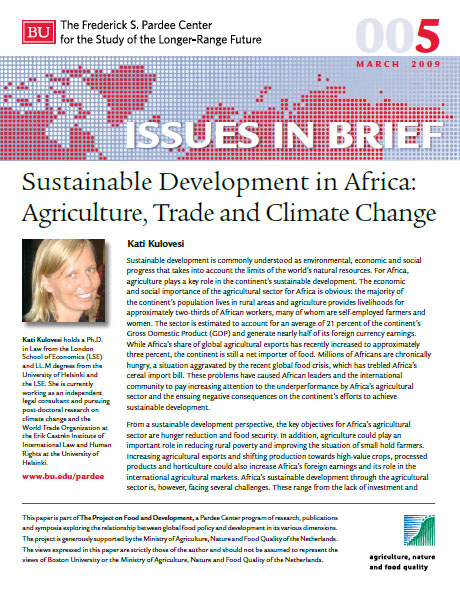Issues in Brief, No. 5, March 2009
 Sustainable Development in Africa: Agriculture, Trade and Climate Change
Sustainable Development in Africa: Agriculture, Trade and Climate Change
By Kati Kulovesi
March 2009 (8 pages)
Download PDF
This paper looks at the confluence of trade, agriculture and climate change in Africa in the context of food and sustainable development. The paper concludes that: “Addressing environmental problems such as desertification, land-degradation and climate change is fundamentally important for Africa’s agricultural sector in the long term. Climate change is predicted to pose considerable challenges for Africa and could drastically reduce rain-fed agricultural productivity by as soon as 2020. To promote the continent’s long-term sustainable development, it is imperative to increase adaptive capacity in the agricultural sector and secure adequate financial resources for this task. Demographic growth projections also stress the importance of finding solutions that secure livelihoods for rural populations through sustainable farming that allows self-sustaining communities to remain that way. Some innovative ideas and proposals are currently emerging from African countries on how to attract new financial resources for projects that address, among other things, deforestation and forest degradation as well as promote the use of sustainable agricultural practices. In light of the seriousness and urgency of the threat that climate change poses to Africa, it is important to further develop and explore these ideas and turn them into practical solutions that enable Africa’s environment and population to follow a path of long-term sustainable development.”
This paper is part of The Project on Food and Development, a Pardee Center program of research, publications and symposia exploring the relationship between global food policy and development in its various dimensions. The project is generously supported by the Ministry of Agriculture, Nature and Food Quality of the Netherlands. The views expressed in this paper are strictly those of the author and should not be assumed to represent the views of Boston University or the Ministry of Agriculture, Nature and Food Quality of the Netherlands.
Kati Kulovesi holds a Ph.D. in Law from the London School of Economics (LSE) and LL.M degrees from the University of Helsinki and the LSE. She is currently working as an independent legal consultant and pursuing post-doctoral research on climate change and the World Trade Organization at the Erik Castrén Institute of International Law and Human Rights at the University of Helsinki.